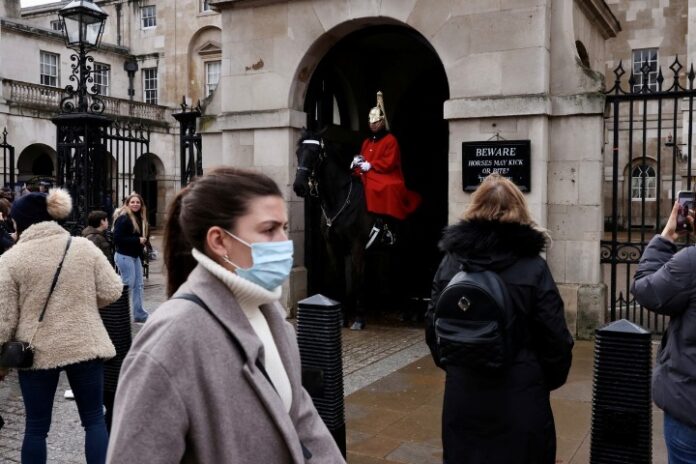Tourists walk near Horse Guards Parade amid the coronavirus disease (COVID-19) outbreak, in London, Britain on Dec 29, 2021. [Photo/Agencies]
Industry urged to remain flexible, prepared for unforeseen challenges
Innovation, technology and digitalization will be key factors in rebuilding the travel, tourism and hospitality sector as the industry bounces back from the impact of the COVID-19 pandemic, industry experts said.
As many countries open up again and relax travel rules, there is an opportunity to rethink the path of travel and tourism, the experts said.
Natalia Bayona, director of innovation, education and investments at the United Nations’ World Tourism Organization, or UNWTO, said: “COVID-19 has changed the way we think about tourism. While before the pandemic, it was rapidly growing and supporting 10 percent of jobs worldwide and employing the greatest number of women and youths, it has become even more important, as it is leading global recovery based on its cross-cutting and resilient nature.”
She also said the sector “has proved its capacity to adapt and evolve. For this reason, nowadays it is impossible to think about tourism without a clear image of innovation and technology”.
Martine Ainsworth, a destination and travel expert and director of British consultancy Ainsworth and Wells, said that the “era of cheap mass market travel will return following a pause during the pandemic”.
“Pent-up demand will drive this over the summer as we desire and take our summer holidays in the sun, (and though) the growing cost-of-living crisis fueled by inflation and oil costs dampens the current appetite, it will come back,” Ainsworth said.
Analysts said the industry needs to constantly evolve, and investing in digital innovation and sustainability are crucial for countries that are reopening to travel.
Bayona, who is also an associate professor at IE University in Spain, said that while traveling will no longer be the same as before the pandemic, the combination of tourism, innovation and sustainability will “keep advancing for years to come”.
Since 2018, the UNWTO has carried out more than 20 programs for innovators, with topics ranging from sustainability and data-driven decision-making regarding destinations to decarbonization and economic involvement of local communities.
Bayona also said that small and medium-sized enterprises, which represent 85 percent of tourism businesses, need to accelerate the move toward digitalization.
To help these businesses, the UNWTO will soon launch the Digital Futures for SMEs Programmme, which has been designed to accelerate the way entrepreneurs digitize, especially regarding connectivity, business growth, e-commerce, big data and analytics, and payments and security.
“Having free access to practical training on any of those paths and the opportunity for direct experience with technology tools will help build resilience,” Bayona said.
Education in the sector is another challenge, as tourism education programs lack a strong focus on entrepreneurship and innovation, she said.
To address this challenge, the UNWTO has created the Tourism Online Academy, a platform designed to foster education with affordable online courses from the best universities around the world.
Ainsworth, the consultancy director, said that travel should no longer be taken for granted, since it seems more expensive even as people’s disposable income is being reduced.
“The pandemic has reminded us that travel is a luxury. … It can be halted as quickly as it starts. We should take care planning where to go and ensuring we have a plan B-insurance, for example, or refund policies-should events arise that prohibit us from traveling,” she said.
The industry also needs to remain flexible and prepared for unforeseen challenges, Ainsworth said.
“We have seen in the (United Kingdom) one sector struggle to quickly upscale staffing due to the sudden release of travel demand-they didn’t expect such an increase in demand,” she said. “There have been long delays at Manchester Airport, for example. They didn’t have enough staff at the airport to handle the number of customers. They had to let staff go over the pandemic and did not recruit enough in time for the restart of travel.”













